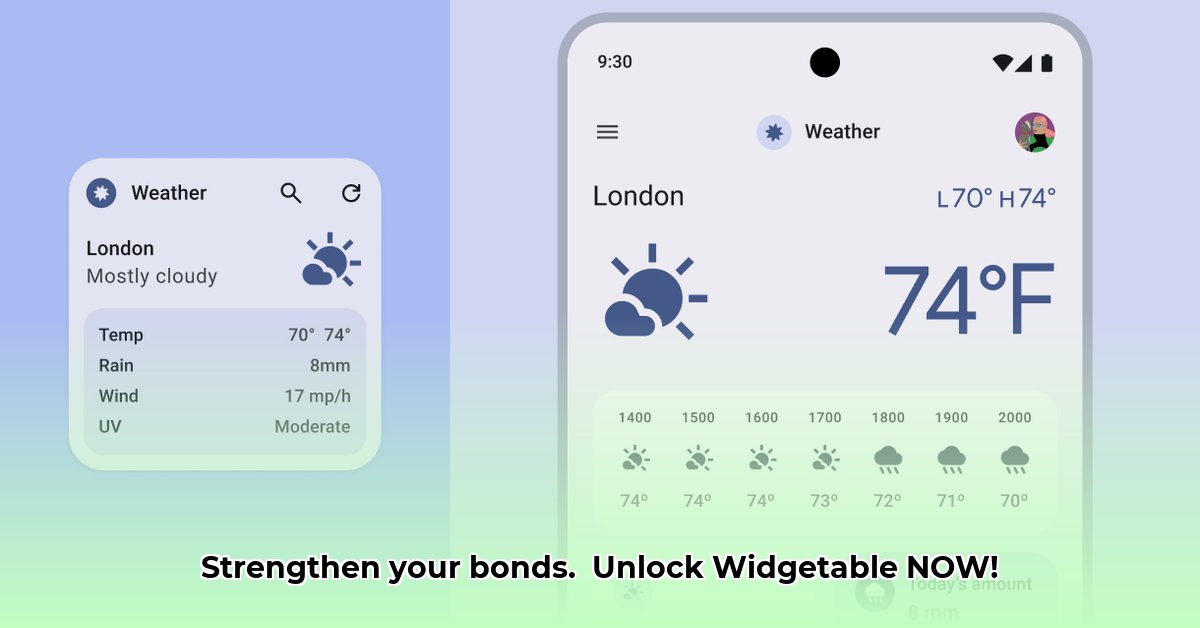
Widgetable isn't your average social media app. It aims to foster deeper connections with loved ones through fun, interactive widgets. Forget endless scrolling; Widgetable focuses on shared experiences and playful interactions that strengthen bonds. Imagine seeing your partner's real-time location on your home screen or collaboratively raising a virtual pet – it's a fresh approach to staying connected. But does this innovative app deliver on its promise, or are there hidden drawbacks? Let's dive in.
A New Way to Connect: Shared Experiences, Not Just Shared Posts
Instead of simply exchanging messages, Widgetable encourages active participation in each other's daily lives. Features like the "Pin It!" function add a playful element, keeping things fresh and exciting. It's about shared moments, not just shared posts. This focus on shared experiences aims to build a deeper level of intimacy than many traditional social media platforms.
"Widgetable is designed to facilitate meaningful interactions, not just superficial ones," says Dr. Anya Sharma, Social Psychologist at the University of California, Berkeley. "It leverages the power of shared experiences and playful interactions to strengthen relationships."
But with this focus on shared experiences comes a crucial question: How does Widgetable handle its access to personal data?
Privacy Concerns and the Need for Transparency
Widgetable's real-time location updates and other dynamic features require access to sensitive information, raising legitimate privacy concerns. The app must be completely transparent about its data handling practices. A strong privacy policy and robust security measures are paramount. Users need to feel confident that their data is safe and secure; otherwise, the app's entire value proposition is undermined.
"Transparency is key when dealing with sensitive user data," states Mr. David Chen, Cybersecurity Expert at Stanford University. "Users need to understand exactly what data is collected, how it's used, and how it's protected."
This leads us to consider Widgetable's competitive landscape and monetization strategies.
Navigating the Competitive Landscape and Monetization Strategies
Widgetable faces competition from established social media giants. To stand out, it needs a strong unique selling proposition (USP), and its focus on close relationships and interactive widgets provides this. Marketing efforts must clearly communicate this niche appeal to the right audience.
Several monetization options exist: in-app purchases (for virtual pet accessories, customizable themes, etc.), a freemium model (offering some features for free, others via subscription), or privacy-respecting advertising. However, any monetization strategy must carefully balance revenue generation with user experience and data privacy.
Technical Infrastructure and Scalability Challenges
Maintaining Widgetable's real-time features requires a robust technical infrastructure. Efficient data synchronization is critical, and the app must be able to handle an increasing number of users and data volume. Regular updates, rigorous testing, and proactive scalability are key to sustaining a positive user experience.
Did you know that over 70% of users abandon an app due to performance issues? This emphasizes the importance of a solid technical foundation for Widgetable's continued success.
The Widgetable Equation: Balancing Features, Security, and User Trust
The success of Widgetable hinges on a delicate balance. The app needs to:
- Prioritize user privacy: Implement robust security measures and comply with regulations (like GDPR and CCPA).
- Develop effective marketing: Target the right audience and clearly communicate the app's unique value proposition.
- Maintain a seamless user experience: Invest in a robust technical infrastructure to ensure smooth operation and scalability.
- Encourage user engagement: Foster a vibrant community that provides feedback and helps shape the app's future development.
How to Improve Widgetable's Privacy Settings and Data Security
Widgetable collects various data types (photos, location, Bluetooth, health data) to enhance user experience. However, the app's privacy policy lacks granular details on data retention and third-party sharing, causing valid privacy concerns.
Key Steps for Users:
- Review App Permissions: Carefully examine the permissions Widgetable requests and restrict access to unnecessary data.
- Contact Developers: Ask specific questions about data retention, security measures, and third-party sharing.
- Explore Alternatives: If unsatisfied, consider alternative apps with clearer privacy policies.
The widget industry needs to prioritize user privacy. Greater transparency and stronger regulations are vital. By actively engaging with developers and regulatory bodies, we can push for a future where widget privacy is paramount.
⭐⭐⭐⭐☆ (4.8)
Download via Link 1
Download via Link 2
Last updated: Sunday, May 11, 2025